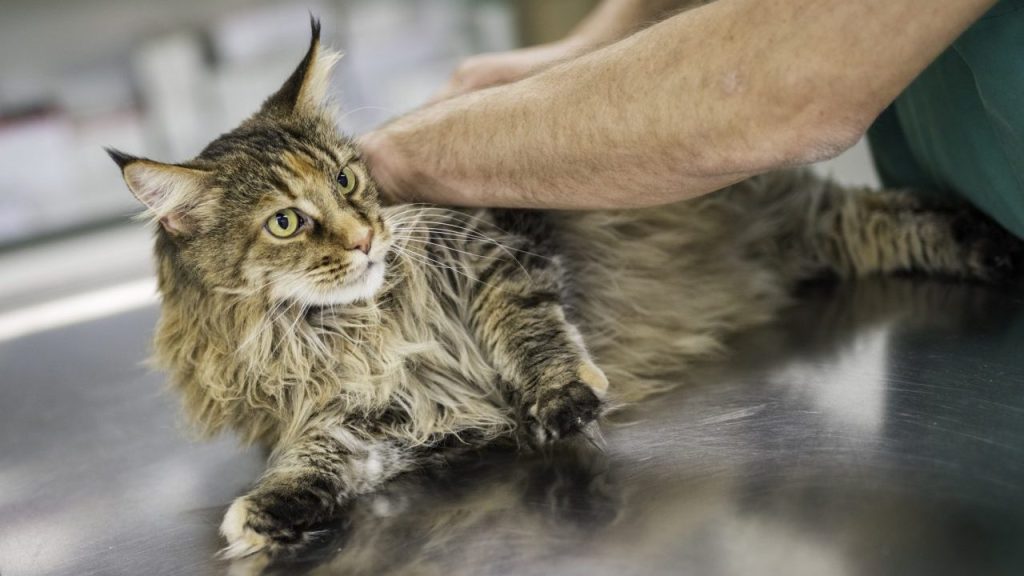When it comes to your fur baby, you want them to have the healthiest, happiest, longest life possible. A big part of that is providing your cat with quality health care. While traditional veterinary medicine plays a crucial role in maintaining a cat’s health, alternative therapies like chiropractic care can also offer numerous benefits. In this guide, we’re going to dive into the wide world of chiropractic care for cats. We’ll cover what conditions this healing modality can treat, how to choose the right chiropractor, what to expect during an appointment, and the potential side effects of treatment.
Does my cat need a chiropractor?
Chiropractic care for cats can be beneficial in various situations, particularly when addressing musculoskeletal issues and promoting overall wellness. Some common conditions that a cat chiropractor can help treat include:
Arthritis
Cats, especially senior ones, can suffer from arthritis. Chiropractic adjustments can alleviate joint pain and improve mobility, enhancing their quality of life.
Back and neck pain
Cats can experience back and neck pain due to injuries, muscle strain, or spinal misalignments. Chiropractic adjustments can help relieve pain, restore alignment, and improve comfort.
Mobility issues
Cats with mobility issues, such as difficulty jumping or climbing, can benefit from chiropractic care. By addressing any misalignments or imbalances in the musculoskeletal system, chiropractic adjustments can enhance mobility and coordination.
Digestive issues
Some cats may experience digestive problems related to spinal misalignments. Chiropractic care can help restore proper nerve function, potentially alleviating digestive issues. Who doesn’t want to clean less hairballs off the couch?
Does pet insurance cover chiropractic care?
Pet insurance coverage for chiropractic care varies depending on the insurance provider and the specific policy. Some pet insurance companies offer coverage for alternative therapies, including chiropractic care, while others may have specific limitations or exclusions.
Review the terms and conditions of the pet insurance policy to understand what is covered and what is not. Even better, give your pet insurance company a call to ask about any limitations, waiting periods, and whether pre-authorization or a referral from a veterinarian is required.
If you don’t have pet insurance yet and chiropractic care is a priority for you, find a pet insurance policy that includes coverage for alternative therapies or specifically mentions chiropractic care in its coverage options.
Note that some pet insurance policies may have annual maximum limits, deductibles, or co-pays that apply to alternative therapies, including chiropractic care. Be sure to review these details to understand your financial responsibility before you get a surprise bill.
How to choose the right cat chiropractor
When seeking chiropractic care for your cat, it is essential to choose a qualified and experienced professional. Here are some factors to consider when selecting a cat chiropractor:
Veterinary credentials
Look for a chiropractor who is a licensed veterinarian. This ensures they have a comprehensive understanding of the cat’s anatomy, physiology, and overall health.
Chiropractic certification
Check if the chiropractor has completed additional training in animal chiropractic care from a reputable institution. Look for certifications from organizations such as the American Veterinary Chiropractic Association (AVCA) or the International Veterinary Chiropractic Association (IVCA).
Experience
Inquire about the chiropractor’s experience working with cats. Ask how long they have been practicing animal chiropractic care and if they have treated cats with similar conditions to your cat’s.
Referrals and reviews
Seek recommendations from trusted sources, such as your veterinarian or fellow cat owners who have utilized chiropractic care for their pets. Additionally, read online reviews and testimonials to gauge the chiropractor’s reputation.
Cat-friendly environment
Cats can be sensitive to new environments and unfamiliar handling techniques. Choose a chiropractor who understands feline behavior and creates a calm and cat-friendly atmosphere during appointments in order to reduce any unnecessary stress and anxiety for your pet.
What to expect at a feline chiropractic appointment
During your cat’s chiropractic appointment, the chiropractor will assess your pet’s overall health, medical history, and any specific concerns you may have. They will conduct a thorough exam. Then, they may also take X-rays. The actual adjustment process typically involves gentle manipulations of the spine and joints, aiming to restore proper alignment and function. The chiropractor may use their hands or specialized instruments, like an activator, to perform these adjustments.
Potential side effects
While chiropractic care for cats is generally considered safe and well-tolerated, it’s important to be aware of potential side effects that may occur, although they are relatively rare. These side effects can include:
Soreness
Following a chiropractic adjustment, some cats may experience mild soreness or stiffness, similar to what humans might feel after a physical therapy session. This discomfort typically subsides within a day or two. You can help minimize the likelihood of your cat prolonging any soreness by elevating their food and water bowls until their physical condition improves. You may also consider reducing the likelihood of them sustaining any injuries from jumping or climbing for a few days by creating cozy spots for their relaxation on surfaces lower to the ground.
Fatigue
Cats may feel tired or lethargic after a chiropractic session. This is often due to the release of tension and the body’s natural healing process. Allow your cat to rest and recover following the adjustment.
Behavioral changes
Cats may exhibit temporary changes in behavior following a chiropractic session. This can include increased affection, restlessness, or changes in appetite. These changes are typically short-lived and should resolve on their own.
Temporary worsening of symptoms
You know the saying, “It gets worse before it gets better”? Well, in some cases, cats may experience a temporary exacerbation of their symptoms after an adjustment. This phenomenon is a “healing crisis” and is a normal response as the body adjusts to the changes. However, if the symptoms persist or worsen significantly, consult with the chiropractor or your veterinarian.
These side effects are generally mild and transient. However, it’s always important to closely observe your cat following a chiropractic session and promptly notify the chiropractor or your veterinarian if you notice any concerning or prolonged adverse effects.
Keeping your cat healthy and happy
Chiropractic care for cats can be a valuable addition to pursuing traditional veterinary medicine, particularly for addressing musculoskeletal issues and promoting overall wellness. By considering the specific needs of your cat, choosing a qualified chiropractor, and understanding the potential benefits, you can make an informed decision regarding their care. Remember, it is always essential to consult with your veterinarian before pursuing any alternative therapies to ensure the best possible outcome for your furry friend’s health and happiness.









